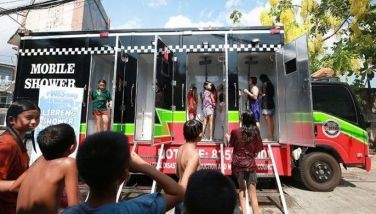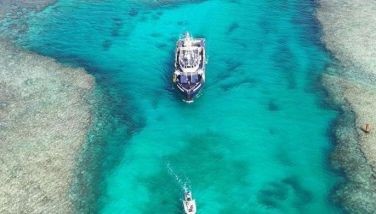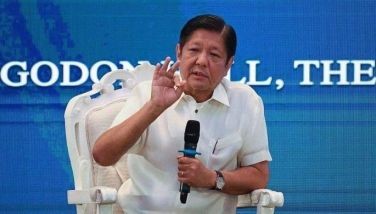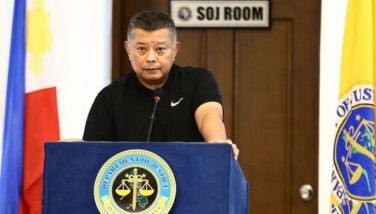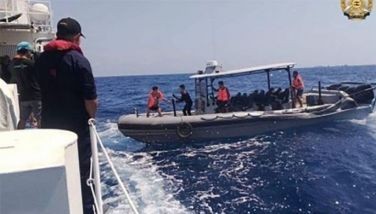Palace firm on exemptions from home quarantine
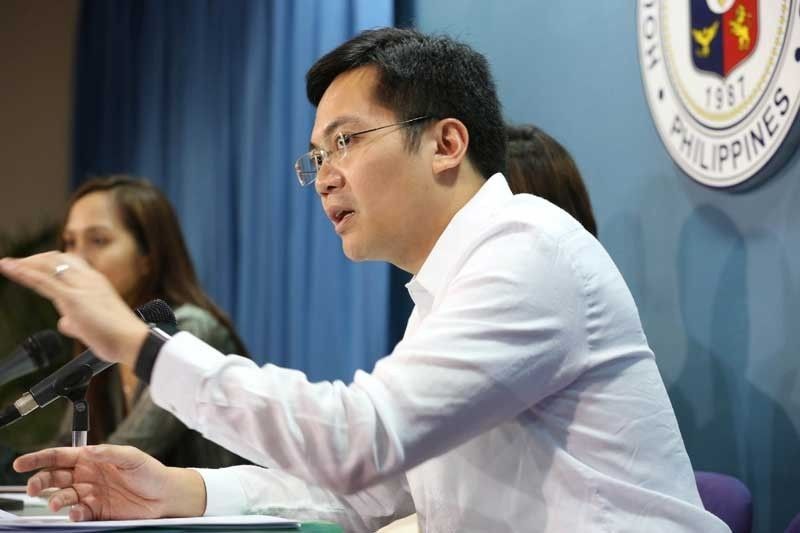
MANILA, Philippines — Malacañang has reiterated that only health workers, police, media, heads of missions and diplomatic staff are exempted from the strict home quarantine policy imposed by the government starting last Monday until April 12 to contain the coronavirus disease 2019 (COVID-19).
At a press briefing late Tuesday night, Cabinet Secretary Karlo Nograles reminded everyone to stay at home, which is the general rule under the one-month lockdown in the entire Luzon.
“Our assumption (is that) if you are outside, it means you are part of the exemption. Now, if you are not, please do not go out anymore. Our lives are on the line here, meaning your life and my life; our entire families and the entire community,” Nograles said.
“The best strategy to contain the virus is to stay home. Because if you are in your homes, and none of you are infected, nobody from your house will become infected. As we have repeatedly said, ‘Bahay muna, buhay muna’ and ‘When in doubt, stay at home,’” he added.
Apart from Nograles, Trade Secretary Ramon Lopez, Labor Secretary Silvestre Bello III and Philippine National Police (PNP) chief Gen. Archie Gamboa joined the briefing to explain the updated guidelines.
Nograles said the government is granting the heads of missions or their designated foreign mission representatives exemption from the strict home quarantine requirement whenever performing diplomatic functions, subject to guidelines to be issued by the Department of Foreign Affairs and provided that protocols on the establishment of skeletal workforces shall be observed.
The government also identified the following as health and emergency frontline workers: public health workers, namely all employees of the Department of Health, DOH hospitals, hospitals of local government units (LGUs) and provincial, city and rural health units; private health workers such as, but not limited to, medical professionals, hospital administrative staff and aides from private health facilities as well as their service providers; and health workers and volunteers of the Philippine Red Cross and the World Health Organization.
Media are also asked to get accreditation/identification cards from the Presidential Communications Operations Office (PCOO).
The Palace also directed all government agencies in the executive branch to issue a list of employees who shall be part of the skeleton staff of their respective offices. Bona fide IDs will still be recognized for the movements until respective offices have issued accreditation orders.
Members of the Inter-Agency Task Force on Emerging Infectious Diseases (IATF) came up with the additional guidelines after they met for four straight hours on Tuesday evening.
Only one person per household will be allowed to buy and access basic necessities, with barangay captains tasked to ensure compliance with the directive, according to Nograles.
Among those who will be allowed to leave their homes are employees of establishments involved in the production, processing and distribution of basic necessities such as food (supermarkets, groceries, convenience stores, wet markets), pharmacies/drugstores and banks or remittance centers; members of the PNP, Armed Forces of the Philippines and other uniformed personnel; those involved in health work, border control, emergency and other mission-critical services; and media with authorization from PCOO.
Nograles stressed that vulnerable individuals such as senior citizens (60 years old and above); those with pre-existing medical conditions like cardiovascular disease, hypertension, diabetes, COPD, cancer and others, as well as pregnant women should not go out during the enhanced quarantine.
He added that even with the enhanced quarantine in place, “all basic utilities should continue to operate, such as water, electricity, internet and telecommunications.”
“Other critical services should remain open, including garbage collection, funeral and interment services and gasoline stations.”
Casinos and Philippine offshore gaming operators will be shut down, and hotels shall not accept any new bookings, according to the Cabinet secretary.
In order to restrict the movement of the public, “all public transportation such as tricycles, pedicabs, taxis/Grab, jeepneys, buses, including MRT/LRT are not allowed to operate.”
To address the suspension of mass public transportation, Nograles said LGUs and employers “should provide point-to-point transportation for people authorized to report for work, specifically health workers.”
He added that transportation from the airport may be provided by the Department of Transportation or the Overseas Workers Welfare Administration for overseas Filipino workers (OFWs), while walking or biking would be allowed.
With regard to travel restrictions, Nograles clarified that Filipinos overseas “can return to the Philippines anytime, including their foreign spouses and children.”
“Other permanent residents of the Philippines may also return. All returning Filipinos and permanent residents from China, Hong Kong and Macau shall be subject to a 14-day quarantine in a quarantine facility. All other returning Filipinos and permanent residents arriving in Luzon shall comply with mandatory home quarantine,” he said.
OFWs, balikbayans and foreign nationals will also be allowed to leave the country any time during the quarantine period “as long as their departure is 24 hours from the time they leave their homes or hotels.”
Nograles reminded the public, however, that no sendoff party will be allowed to accompany departing passengers and that Filipinos who would leave the country as tourists to any destination would not be allowed to leave.
Meanwhile, movement of cargo through air, land and sea would remain unhampered during the quarantine period, and that cargo trucks and vans should not be blocked from entering the ports, expressways or highways.
Nograles appealed to the public for cooperation, which is crucial to helping the country overcome the COVID-19 crisis.
“Kung magkakanya-kanya tayo, hindi tayo magtatagumpay. ’Ika nga ni Presidente: together, we can beat COVID-19; together, we heal as one,” he said.
‘Big joke’
Interior and Local Government Secretary Eduardo Año had earlier admitted that the government’s initial quarantine measures to prevent COVID-19 from spreading was a “big joke.”
Año made the assessment of the government’s initial response in addressing the crisis by placing only Metro Manila under a community quarantine but with certain conditions.
Among those conditions was allowing into Metro Manila people from adjacent provinces who are working in the region. People were also free to move as public transportation was not suspended.
“It’s actually a big, big joke kasi ’yun bang bantayan mo na huwag mag-spread ’yung virus pero in-allow mo naman kumilos ’yung mga spreader, so wala rin ’yun,” Año said in an interview over radio dzBB.
The interior chief had earlier said asymptomatic COVID-19 carriers are more dangerous as they unwittingly spread the virus.
Año added that the long queues at the border control points separating Metro Manila from the provinces of Bulacan, Rizal, Laguna and Cavite also did not help the government’s efforts in containing the virus.
Emergency employment program
Workers affected by the enhanced community quarantine can get paid by disinfecting their homes and their communities, according to the Department of Labor and Employment (DOLE).
Labor Secretary Silvestre Bello III said informal workers whose activities are disrupted by the Luzon-wide enhanced community quarantine may join the government’s emergency employment program, dubbed the Tulong Panghanapbuhay sa Ating Displaced/Disadvantaged Workers (TUPAD).
Bello added that informal workers include vendors and public transportation drivers.
“If you are an informal worker, you sell mangoes or vegetables or you drive a tricycle and you cannot work because of the enhanced community quarantine, we will give you work. This is good maybe between 10 to 20 days,” the labor chief said at a press briefing at Malacañang the other night.
“The work we will give you is you will disinfect first, your house, second, the house of your neighbor and the areas you pass by when you go home or report for work... They shall receive 100 percent of prevailing highest minimum wage in the their region,” he added as he noted that DOLE would provide the cleaning solution and ensure that beneficiaries would observe safety measures, like regular washing of hands.
Interested workers can go to their barangay officials, who will then submit their names to the DOLE, according to Bello. He noted that a similar system was implemented when Boracay was closed for six months to give way to a rehabilitation program.
“We will include them in the list of beneficiaries and then we let them work,” he said.
Funding for the program shall come from the 2020 budget under the DOLE’s Livelihood and Emergency Employment Services of the Office of the Secretary, according to Bello.
?Leave credits
Bello also reminded employers that they cannot force their workers who are required to undergo self-quarantine to use their leave credits.
“You decide when to use your leave credits. Nobody can force you to use it if you don’t want to use it,” he said. “(The use of) leave credits is left to the discretion of the worker.”
The labor chief added that the DOLE is ready to pay the salary of workers who will be ordered to go on self-quarantine but have used up all their leave credits.
“If your employer forces you to undergo a 14-day quarantine and you no longer have leave credits, the DOLE will sacrifice and subsidize the employer. We will pay for your 14-day quarantine period,” he said.
Bello appealed to businesses to pay the salaries of employees who cannot report for work for a month because of the home quarantine protocols.
“We hope, out of Christian charity, they will pay (their workers) even if they are absent. This is just an appeal,” he said. – With Emmanuel Tupas, Alexis Romero, Mayen Jaymalin, Mary Grace Padin
- Latest
- Trending














